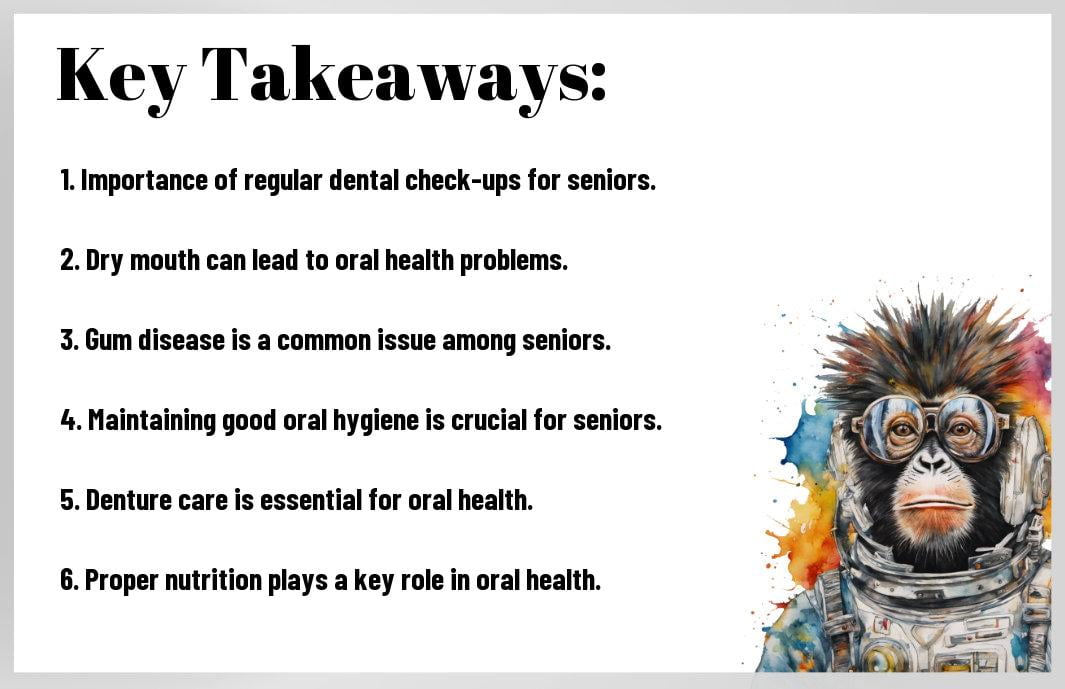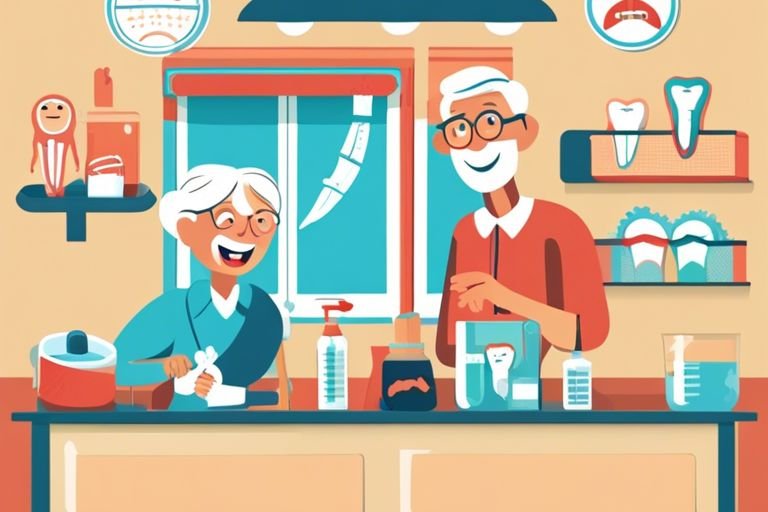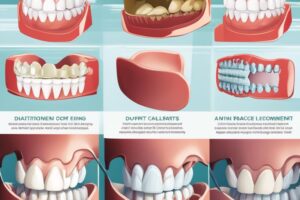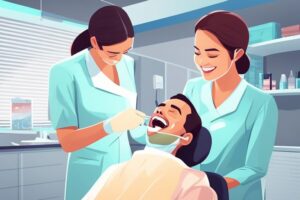As individuals age, they may experience a myriad of oral health issues that can significantly impact their overall well-being. From tooth decay to gum disease, seniors are particularly susceptible to a range of dental problems. In this informative blog post, we will explore some of the most common oral health issues that seniors face and provide tips for maintaining dental well-being as they age. By understanding these issues and implementing proper dental care techniques, seniors can ensure that their oral health remains in optimal condition for years to come.
Key Takeaways:
- Promote Proper Oral Care: Seniors should ensure they maintain good oral hygiene by brushing teeth regularly, using fluoride toothpaste, and flossing daily to prevent common issues such as cavities and gum disease.
- Regular Dental Check-ups: It is crucial for seniors to visit the dentist regularly for check-ups and professional cleanings to detect and address any potential oral health issues early on, as aging can lead to a higher risk of dental problems.
- Address Dry Mouth: Seniors should be aware of and address dry mouth, which is a common issue that can lead to oral health problems, by staying hydrated and using over-the-counter saliva substitutes as recommended by a dentist.
Common Oral Health Issues in Seniors
Some Facts About Older Adult Oral Health show that seniors are more prone to certain oral health issues. As we age, our oral health needs change and it’s important to be aware of the common issues that can arise.
Tooth Decay and Cavities
One of the most common oral health issues among seniors is tooth decay and cavities. The aging process can lead to a decrease in saliva production, making it easier for bacteria to thrive and cause decay. Additionally, receding gums and the use of certain medications can contribute to an increased risk of cavities.
It is crucial for seniors to maintain a thorough oral hygiene routine and visit their dentist regularly to prevent and treat tooth decay and cavities.
Gum Disease
Common among seniors, gum disease is a serious oral health issue that can lead to tooth loss if left untreated. Symptoms of gum disease include swollen, tender, or bleeding gums, and it is often caused by poor oral hygiene, smoking, or underlying health conditions such as diabetes.
Plus, gum disease has been linked to other health issues such as heart disease and diabetes, making it imperative for seniors to address this issue promptly.
Oral Cancer
Disease prevention becomes crucial with oral cancer, as seniors are at a higher risk of developing it. Regular dental check-ups can aid in early detection and treatment of oral cancer. Additionally, lifestyle factors such as tobacco and alcohol use can significantly increase the risk of developing oral cancer.
Cavities, gum disease, and other oral health issues can be detected and treated early during regular dental check-ups, making them an essential part of proactive oral healthcare for seniors.
Dry Mouth
Cavities and gum disease can be exacerbated by dry mouth, which is a common issue among seniors. Dry mouth can be caused by medications, certain health conditions, and the natural aging process. It can lead to discomfort, difficulty in speaking and swallowing, and an increased risk of oral health issues.
Issues such as dry mouth can be alleviated with proper hydration, mouth rinses, and discussing medication options with a healthcare professional to mitigate its effects.
Tooth Loss
Any potential issues that may lead to tooth loss should be addressed promptly. Seniors are more susceptible to tooth loss due to factors like gum disease, tooth decay, and poor oral hygiene habits. Tooth loss can impact an individual’s ability to chew, speak, and can also have a negative impact on their confidence and overall well-being.
With proper oral care and regular dental visits, seniors can minimize the risk of tooth loss and maintain a healthy smile well into their golden years.
Preventive Measures and Maintenance
Your oral health is a crucial aspect of your overall well-being, especially as you age. Preventive measures and consistent maintenance are key in ensuring that your dental health remains in optimal condition. By incorporating daily oral hygiene practices, regular dental check-ups, proper diet, and managing dry mouth, you can significantly reduce the risk of common oral health issues and maintain a healthy smile for years to come.
Daily Oral Hygiene Practices
With consistent daily oral hygiene practices, such as brushing your teeth twice a day and flossing regularly, you can effectively remove plaque and food particles that contribute to tooth decay and gum disease. Additionally, using an antimicrobial mouthwash can help reduce bacteria in your mouth, further promoting oral health.
Regular Dental Check-ups
Preventive dental check-ups are essential for early detection and treatment of any oral health issues. By visiting your dentist for regular check-ups and cleanings, you can address any concerns before they develop into more serious problems. The dentist can also perform professional cleanings to remove stubborn plaque and tartar, contributing to overall oral well-being.
For instance, regular dental check-ups may include X-rays to detect hidden dental issues and oral cancer screenings for early detection and treatment.
Diet and Oral Health
The foods and beverages you consume play a significant role in your oral health. A diet rich in fruits, vegetables, and dairy products can provide essential nutrients for strong teeth and gums while minimizing sugary and acidic foods can help prevent tooth decay and enamel erosion.
Health conditions such as diabetes can also affect your oral health, emphasizing the importance of a balanced diet and its impact on your overall well-being.
Managing Dry Mouth
Dental hygiene is crucial in managing dry mouth. Drinking plenty of water, using sugar-free lozenges, and avoiding caffeine and tobacco can help alleviate dry mouth symptoms and reduce the risk of cavities and gum disease.
Treatment Options
Not addressing dental issues in seniors can lead to serious health complications. It is important for seniors to be aware of the various treatment options available to maintain their oral health.
Restorative Procedures
The most common restorative procedures for seniors include fillings, crowns, and bridges. These procedures are crucial for repairing damaged or decayed teeth, restoring their function, and preventing further deterioration. Seniors should consult with their dentist to determine the most suitable restorative procedure based on their individual needs and oral health condition.
The advancement in dental technology has also introduced innovative restorative options such as dental implants, which provide a long-term solution for replacing missing teeth and restoring oral function. Seniors can benefit from these modern restorative procedures to improve their overall dental well-being.
Gum Disease Treatment
Restorative measures for gum disease often involve deep cleaning procedures such as scaling and root planing. These treatments are essential in removing plaque and tartar build-up below the gum line, which can lead to gum inflammation and infection. It is crucial for seniors to address gum disease promptly to prevent further damage to the gums and underlying bone.
A proactive approach to gum disease treatment is imperative in maintaining optimal oral health and preventing potential complications such as tooth loss and systemic health issues.
Advanced gum disease treatment may require surgical intervention, such as gum grafts or pocket reduction procedures, to restore gum tissue and support the teeth. Seniors should prioritize regular dental check-ups to monitor and address any signs of gum disease.
Dentures and Implants
Any missing teeth can significantly impact a senior’s ability to chew and speak properly. Dentures and implants are viable solutions to replace missing teeth and restore oral function. Both options offer long-term benefits and can greatly improve a senior’s quality of life.
To ensure the success and longevity of dentures and implants, seniors should maintain good oral hygiene practices and attend regular dental appointments for professional care and maintenance. Proper care and maintenance are essential in maximizing the functionality and lifespan of these restorative appliances.
Conclusion
Ultimately, maintaining good oral health is essential for seniors to ensure overall well-being and quality of life. By being aware of common dental issues such as cavities, gum disease, and tooth loss, seniors can take proactive steps to prevent and treat these problems. Regular dental check-ups, proper oral hygiene practices, and a balanced diet are key to maintaining dental well-being in senior years. For more information on senior dental care issues and prevention, visit Senior dental care: Issues and prevention.
Senior Oral Health – Common Issues And Tips For Maintaining Dental Well-being
Q: What are common oral health issues faced by seniors?
A: Common oral health issues for seniors include gum disease, tooth loss, dry mouth, oral cancer, and a decrease in saliva production.
Q: How does aging affect oral health?
A: Aging can lead to natural wear and tear on teeth, a decrease in saliva production, gum recession, and an increased risk for oral health conditions such as periodontal disease and tooth decay.
Q: What are some tips for maintaining good oral health as a senior?
A: To maintain good oral health as a senior, it is important to brush and floss regularly, have regular dental check-ups, eat a balanced diet, avoid tobacco and excessive alcohol consumption, and use fluoride toothpaste and mouthwash.
Q: How can seniors manage dry mouth effectively?
A: Seniors can manage dry mouth by staying hydrated, using sugar-free gum or lozenges to stimulate saliva production, using a humidifier in their living space, and discussing prescription medication side effects with their healthcare provider.
Q: What role does nutrition play in senior oral health?
A: Nutrition plays a crucial role in senior oral health as a balanced diet rich in vitamins and minerals supports overall oral health and can help prevent issues such as gum disease and tooth decay. Seniors should include plenty of fruits, vegetables, lean proteins, and dairy in their diet for optimal oral health.







